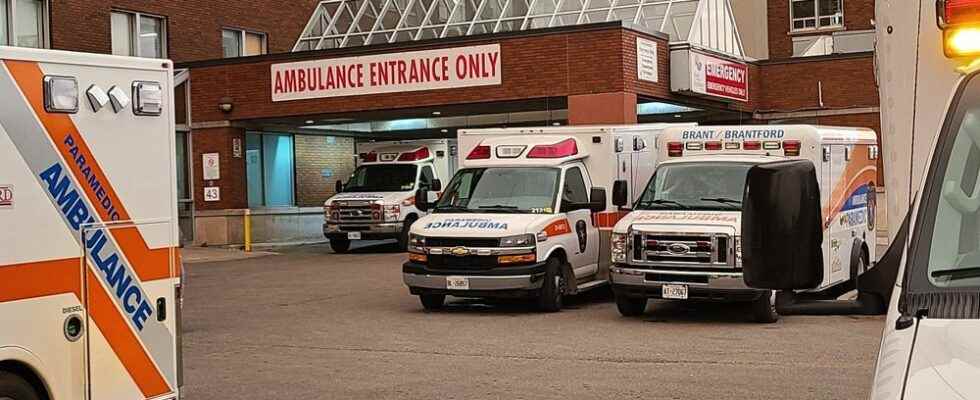Demand for care, staffing issues taking toll

A dramatic increase in calls for help and lengthy patient off-load delays are putting the community in peril, paramedics in Brant County say.
“We’re drowning in calls and spending more time in the emergency room than on the road responding to calls,” Hillary Henderson, a spokesperson for about 130 paramedics in Brantford and Brant County. “It’s not a matter of if we will have a major problem, it’s a matter of when.
“I’ve been a paramedic for 22 years and in all that time I’ve never seen it this bad.”
Patient off-load delays refers to the amount of time paramedics spend at Brantford General Hospital waiting for patients to be admitted to the care of the Brant Community Healthcare System.
Henderson said the process can take hours and reduces the number of local ambulances available for emergencies.
“When we’re in emerg we can still hear the calls coming in, but we’re in a position where we can’t respond,” Henderson said. “It’s frustrating because we can’t get to that call.”
The situation is wearing paramedics down and Henderson, the unit steward for OPSEU Local 256 which represents local paramedics, said several are off duty and on stress leave.
The off-load delays result in what paramedics call Code Zeros, meaning there are no local ambulances available to respond to an emergency. When that happens, ambulances are called in from other neighboring jurisdictions.
Ambulances from other services are called in to Brantford-Brant three or four times a day.
Russ King, chief of the Brant-Brantford Paramedic Service, acknowledged off-load delays have increased steadily since the start of 2022.
The delays are a result of several factors including a growing region and aging population as well as an increase in calls for service.
So far this year, the service has responded to 17,163 calls, up from 14,186 for the same time period in 2021.
“As well, the Brantford General Hospital, like most other hospitals in the province, is facing significant staffing shortages and service pressures,” King said. “The entire healthcare system is strained.”
The service added another permanent 12-hour shift vehicle and staff on July 1 to help with the increase in calls.
Paramedics, King said, have done an incredible job throughout the pandemic.
David McNeil, president and CEO of the Brant Community Healthcare System, said there are a lot of factors contributing to the off-load problem.
McNeil also acknowledged the problem is getting worse.
The biggest issues driving the problem are demands for care, patient flow and staffing issues throughout the healthcare system provincially and locally.
“We’re seeing a lot of (job) vacancies across the healthcare system not only here in Brant but across the province,” McNeil said.
The clinical staff shortages are affecting all departments including the emergency room, McNeil said adding that fixing the problems will require changes within the entire healthcare system not just at hospitals.
“I would describe our staffing as fragile, in our organization and something we deal with on a day-to-day basis,” McNeil said. “But within that context, during the early days of COVID we celebrated our healthcare workers for their bravery and showing up each day to care for others.
“We’re now at the tail end of that and our workers are extremely tired.”
But they’re still coming in to work every day, knowing that they won’t be working with a full complement of staff, McNeil said.
“They’re being courageous, they’re demonstrating their commitment to their community and as an organization, and I know our board, we’re deeply indebted to them for their commitment to keeping our community safe,” McNeil said.
twitter.com/EXPVBall
